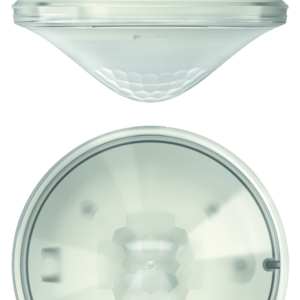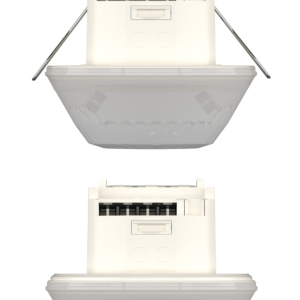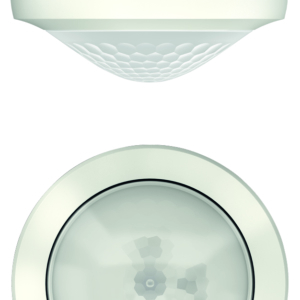Passive infrared presence detector for ceiling mounting
Square detection area 360° (up to 64 m) for reliable and easy planning
Automatic presence- and brightness-dependent control for lighting
Mixed light measurement suitable for fluorescent lamps (FL/PL/ESL), halogen/incandescent lamps and LEDs
Channel A, light: relay, 230V
Choice of fully or semi-automatic operation
Adjustable brightness switching value, teach-in function
Self-learning time delay
Connection option for sensors or switches for manual switching with automatic recognition of sensor/switch
Pulse function for staircase light time switch
Ready for immediate use due to factory preset
Exceptionally easy configuration of the energy-saving behaviour with the new «eco plus» function
Test mode for checking function and detection area
Extension of detection area via Master/Slave or Master/Master switching, a maximum of 10 detectors can be switched in parallel with each other
Ceiling installation in flush-mounted socket
Ceiling installation also possible with surface-mounted frame
User remote control theSenda S, management remote control SendoPro (optional)
* According to warranty terms and conditions, see www.theben.de/en/guarantee
Light channel
Switching response is controlled by presence and brightness. The switch contact closes during darkness and when someone is present. It opens with a delay when there is brightness or when no one is present.
Time delay
The minimum switch-off delay (10 s – 60 min) is adjustable. It adjusts automatically to the user‘s behaviour and can increase independently to 30 minutes or reduce back to the set minimum time. With settings ≤ 2 mins or ≥ 30 mins the time delay remains unchanged at the set value. If someone goes into an unoccupied room only briefly and leaves it within 30 seconds, then the light shuts off prematurely after 2 minutes (short-term presence).
Push button control
The lighting can be manually switched at any time via a push button or switch. If the light is switched on manually, the light will remain on for at least 30 minutes providing people are present. It then switches off when the brightness is adequate. The light will go off after a preset time delay if the room is vacated. If artificial lighting is switched off manually. the lighting remains switched off as long as the room is occupied. The lighting switches on again automatically after the switch-off delay has expired.
Fully or semi-automatic
Lighting control via the presence detector operates fully automatically for increased comfort or semi-automatically for greater energy savings. In «fully automatic» the lights switch on and off automatically. Light switching has to be completed manually in «semi-automatic mode». The lighting is switched off automatically.
Staircase light function
The staircase light function can be set to „room“ or „corridor“ using the DIP switch or the SendoPro management remote control. Lighting can be switched on and off manually at any time in the ‚room‘ position. The detector operates as a staircase light control in the ‚corridor‘ setting. Manual switch off is no longer possible.
Exceptionally easy configuration of the energy-saving behaviour
By selecting “eco†for optimal switching behaviour or “eco plus†for maximum energy saving, users can adjust the presence detector to their requirements very easily.
Pulse function
Time delay can be set to pulse for controlling existing staircase light time switches. In this every 10 seconds the light output produces a pulse of 0.5 seconds duration if people are present or it is dark.
Switching
The presence detectors can be combined as master and slave: master in individual switching, master in parallel switching, master-slave parallel switching.
Several push buttons can connected to one control input. Illuminated push button switches can only be used with neutral conductor connection.
Single unit operation
In individual switching, the presence detector as master detects presence and brightness and controls lighting.
Master/slave parallel connection
If the detection area covered by one presence detector is insufficient (larger rooms), then up to 10 detectors can be operated in parallel by connecting P terminals. In the process presence detection is performed by all detectors together. The master measures the brightness, operates the push buttons and controls the lighting. All other detectors are used as slaves. They only provide presence information.
Light measurement only with the master
Parameters are only set on the master
Switch up to 10 detectors in parallel
Use the phase conductor with the same phase for all detectors
Master-Master parallel switching (for several lighting groups)
Several Masters can be used in parallel switching setup. Each Master controls its lighting group according to its own brightness measurements. Delay times and brightness switching values are set individually on each Master. Presence continues to be detected by all the detectors.
One Master with individual brightness measurement per lighting group
Set parameters and DIP switch individually for each Master
Switch up to 10 detectors in parallel
Use the phase conductor with the same phase for all detectors
The presence switch contact can be read by any master
The square detection area of the presence detector guarantees accurate and simple planning. Square detection areas make it possible to cover a whole room with parallel switching. Note that seated and moving persons can be detected in differently-sized areas. The recommended installation height is 2.0 m – 3.0 m. The sensitivity of the presence detector decreases with higher installation heights. Walking motions are necessary from installation heights of 3.0 m and the detection areas of several detectors should overlap in the marginal zones.
Seated persons:
The presence detector reacts very sensitively to the slightest movements. The details relate to the reduced detection area for movements at table height (approx. 0.80 m). The detection sensitivity is reduced from an installation height of > 3.0 m. More pronounced movements are required for clear detection.
Moving persons:
Use of the whole detection area with low tolerance in marginal area (+/- 0.5 m).
The presence detector measures artificial light and daylight that is reflected directly below the detector (opening angle approx. ± 25°). The installation site is a reference point for the lighting level. Brightness measurement can be adapted to the conditions in a room with the room correction factor. Direct light influences the light measurement. The placement of the floor lamps or suspended lighting directly below the detector is to be avoided. If the brightness measurement is deactivated, the light channels only switch depending on the presence (brightness threshold value set to „lux on“ via potentiometer or set to „measurement on“ via the remote control).
Suitable lamps
The presence detector is designed for the operation for fluorescent lamps, compact fluorescent lamps, halogen/incandescent lamps and LEDs. The maximum number of switchable lights is restricted due to the high switch-on peaks of the EBs and LED drivers. The use of an external contactor helps with large loads. Parallel switching enables allocation of load to several Masters. All switched loads must be properly suppressed.
Flush-mounted installation
The flush-mount installation of the detector is done using a standard UP (flush-mount) installation socket Size 1.
Ceiling installation
A ceiling installation unit is available for a simplified ceiling installation of the detector (see accessories). This ensures strain relief and contact protection at the same time. The installation diameter is 72 mm (drill diameter 73 mm).
Surface-mount installation
A suitable surface-mount frame is available for surface installation (see accessories).






